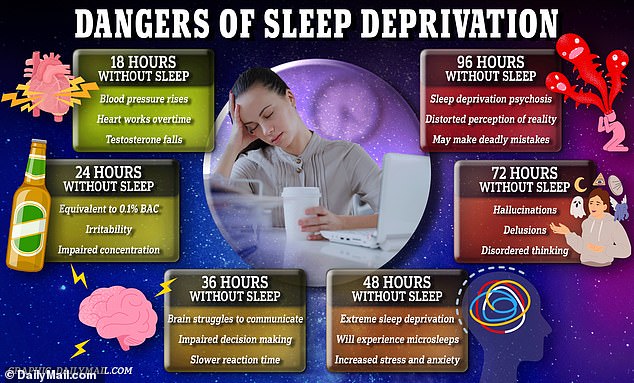Watching TV or gaming right before bed has no effect on children’s sleep, according to a shocking new study
Research out today shows that allowing children to use smartphones and tablets or watch television before bed has “little impact” on their sleep.
Experts have long warned about the impact of screen time on children’s development.
But scientists in New Zealand, who tracked the screen time of dozens of children between the ages of 11 and 14, found that their sleep health was not affected.
Only when they used their devices in bed did it take them longer to fall asleep.
This comes after Swedish health authorities decided yesterday that toddlers should not watch television or other screens and that screen time for older children should be limited.
Experts have long sounded the alarm about the impact of screen time on children’s development. But researchers in New Zealand who tracked the screen time of dozens of children aged 11 to 14 found that their sleep health was not affected
Experts have previously warned that children who regularly use smartphones, tablets and computers may become more irritable, have difficulty concentrating and retain information for only half as long as children who do not.
Research also shows that children who spend more time in front of a screen are more likely to have behavioral problems or depression.
But the study’s lead author and an expert on electronic media and sleep at the University of Otago said: ‘Our most interesting findings were that screen time before bed had little impact on their sleep that night.
‘But screen time in bed did affect their sleep, causing them to lose about half an hour of sleep and resulting in less sleep that night.’
“We need to revise sleep guidelines to make them fit the world we live in and actually make sense. The current guidelines are not feasible or appropriate for the way we live.”
In the study, researchers asked 79 11- to 14-year-olds to wear a bodycam on their chest from three hours before bedtime until they went to bed.
In addition to the bodycam that recorded when, what and how participants used their screens, a second infrared camera was placed in their bedrooms to record screen time in bed.
They also wore an actigraph, a watch-sized device that measures sleep.
A week-long follow-up study found that 99 percent of participants still used a screen in the two hours before bedtime.
More than half of participants used screens once in bed, and a third did so after first trying to go to sleep.
They also found that once they were in bed, more interactive screen activities like gaming and multitasking (when more than one device is used at once, such as watching Netflix on a laptop while playing Xbox) disrupted their sleep more.
Each additional 10 minutes of this kind of screen time reduced the amount of sleep they got that night by almost the same percentage, they said.
Writing in the diary JAMA PediatricsThe researchers added: ‘Adolescents appeared to adjust their wake times to ensure they got a consistent amount of sleep, despite later bedtimes associated with screen use.
‘Our findings suggest that the impact of screen time on sleep is primarily due to time displacement, which delays sleep onset, rather than the direct effects of blue light or interactive engagement.’
However, the scientists acknowledge that the study had “some limitations,” including the fact that participants may have changed their behavior because they knew they were being observed.

Lack of sleep can lead to obesity, memory loss, diabetes, heart disease, heightened and unstable emotions, decreased learning ability, and a reduced immune response, leaving you vulnerable to disease.
They added: ‘However, participants repeatedly told us that they quickly forgot about the cameras, and tests of reactivity showed no differences in screen time.’
This comes after the Swedish Public Health Authority yesterday advised parents not to let children under the age of two use smartphones and tablets or watch television.
Children between the ages of two and five may also spend a maximum of one hour a day in front of a screen, according to new recommendations.
Children between the ages of six and twelve should not spend more than an hour or two a day in front of a screen.
It follows a similar move by Danish authorities, who issued their own age-specific rules last September, allowing only children under the age of two to use the devices in “very special cases”, such as those with learning disabilities.
In 2019, the World Health Organization also advised against allowing children under the age of three to watch television or play games on a tablet.
Children aged three and four should also not spend more than an hour a day in front of a screen, the agency said.

It comes as the Swedish Public Health Agency yesterday advised parents not to let children under the age of two use smartphones and tablets or watch television. Jakob Forssmed, Minister of Social Affairs and Health, said: ‘For too long, smartphones and other screens have been allowed to invade every aspect of our children’s lives’
However, British experts said at the time that the guidelines were based on insufficient evidence and failed to recognise that not all screen time was bad for children.
A 2019 report from the Royal College of Paediatrics and Child Health also concluded: ‘We consider that the risks from screen exposure should not be overstated.’
They added: ‘The literature takes little account of the increasing demand for doing school homework via a screen.
‘We find that there is no evidence that homework done on a screen is associated with greater or lesser health harms or benefits than homework done in the traditional way.’
Children’s screen time has increased dramatically during the Covid pandemic, when lockdowns and school closures have forced them indoors.
In the UK, neither the NHS nor the National Institute of Clinical Excellence (NICE) have detailed guidelines on screen time in babies and toddlers.
However, they do recommend a maximum of two hours per day for all children.
The UK’s Chief Medical Officer also advises taking a ‘precautionary approach’ when using screen equipment.
